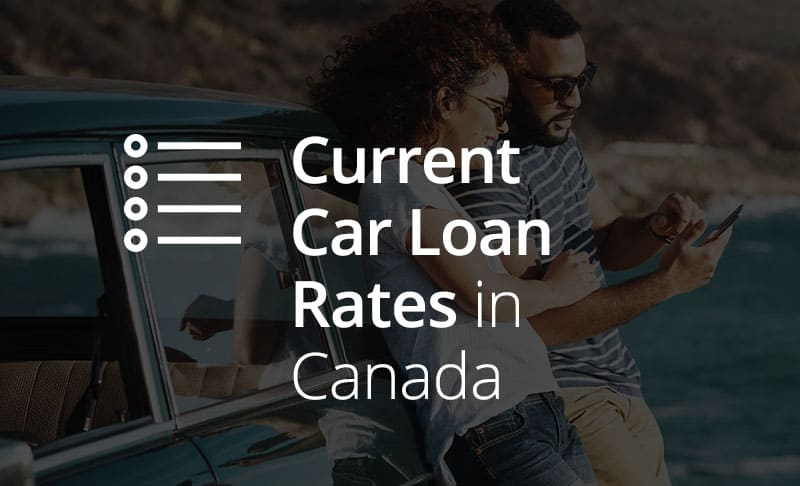
Current Car Loan Rates In Canada
When financing a new or used car purchase, getting a good interest rate is important for saving money. Researching current car loan rates in Canada can help you compare financing and car-buying options to get the best deal possible.
IN THIS GUIDE, WE COVER:
- Current car loan rates in Canada
- How rates vary by lender
- Why rates matter for car-buying
- What factors influence current car loan rates in Canada
- How to improve your odds of getting the best rate on a car loan
At A Glance
- New Car Loans 0% – 8.99%
- Used Car Loans 5% – 12.99%
- By Credit Score
- Excellent (760+) 3.99% – 6.99%
- Good (700-759) 4.99% – 8.99%
- Fair (600-699) 7.99% – 12.99%
- Poor (Below 600) 12.99% – 29.99%
- Loan Term Length
- 24-36 Months Lower rates, 0% – 7.99%
- 48-60 Months Standard rates, 4.99% – 12.99%
- 72-84 Months Higher rates, 6.99% – 15.99%
- Promotional Rates Starting at 0% for 12-36 Months
Explaining Car Loan Interest Rates
Car loan interest rates are the cost of borrowing money to finance a vehicle. These rates determine how much extra you’ll pay over the life of your loan in addition to the price of the car. Understanding how car loan interest rates work can help you make smarter financial decisions and save money in the long run.
How Car Loan Interest Rates Are Determined
Car loan interest rates are influenced by several key factors:
- Credit Score: Your credit score is one of the most important factors in determining your interest rate. A higher score means lower risk for lenders, which can earn you a better rate. If your credit score is lower, expect higher interest rates to offset the lender’s risk.
- New Vs. Used Vehicles: New car loans typically come with lower interest rates compared to used car loans. Lenders see new cars as less risky because they hold their value longer, while used cars depreciate faster.
- Loan Term: The length of your car loan affects the interest rate. Shorter loan terms, such as 36 months, generally come with lower interest rates. Longer loan terms, like 72 or 84 months, can result in higher rates due to the increased risk over time.
- Down Payment: A larger down payment reduces the loan amount, which lowers the lender’s risk. This can help you secure a lower interest rate.
- Lender Type: Banks, credit unions, dealerships, and online lenders all offer car loans, but the interest rates can vary. Dealerships may offer promotional financing as low as 0% for new cars, while banks and credit unions typically offer competitive rates based on your creditworthiness.
Fixed Vs. Variable Interest Rates
- Fixed Interest Rates: These rates stay the same for the duration of your loan. Your monthly payment is predictable, making it easier to budget.
- Variable Interest Rates: These rates fluctuate based on market conditions. While they can start lower than fixed rates, there’s a risk of your payments increasing over time.
Why Interest Rates Matter
The interest rate you get on your car loan directly impacts your monthly payment and the total cost of the loan. Even a small difference in your interest rate can add up to hundreds or thousands of dollars over time.
For example:
- A $25,000 car loan at 4.99% interest for 5 years will cost you approximately $3,300 in interest.
- The same loan at 8.99% interest will cost you over $6,100 in interest.
That’s why it’s important to shop around, compare rates, and understand your loan options before signing any agreements.
Current Car Loan Rates in Canada
Major Banks
- Scotiabank: 6.99% – 11.73%
- TD Bank: 6.99% – 29.99%
- Desjardins: 6.99% – 10.49%
- RBC: 7.15% – 9.99%
- CIBC: 7.20% – 9.99%
- National Bank of Canada: 7.49% – 9.99%
- BMO: 7.99% – 10.99%
- General Bank of Canada: 8.99% – 10.99%
- Source One: 8.99% – 29.99%
- Rifco: 9.99% – 24.99%
- Scotia Dealer Advantage: 9.99% – 29.99%
- Axis Auto Finance: 9.99% – 31.99%
- AutoCapital Canada: 10.49% – 23.99%
- iA Auto Finance: 10.99% – 29.99%
- Northlake Financial: 10.99% – 29.99%
- Eden Park: 11.99% – 23.99%
- Santander Consumer: 11.99% – 29.99%
- LendCare: 11.99% – 34.99%
How Rates Vary by Lender
Where you decide to get financing can impact the rates you’ll pay for a car loan.
Your options for getting auto financing include:
- Bank loans
- Credit union loans
- Online auto lenders
- Dealership financing
Banks and credit unions can offer favorable loan rates for the most qualified borrowers. For example, if you have a great credit score and a good banking history, you might be eligible for 0% financing through your bank.
A bank or credit union could also be a good choice for getting a reasonable rate on a car loan if you’re a newcomer to Canada. Lenders like RBC have special car financing options available for new immigrants who don’t have a limited Canadian credit history.
Online car lenders can offer 0% financing but you’re more likely to pay higher rates if you have less than perfect credit. Online lenders can have current car loan rates in the 30% or higher range for borrowers who have no or poor credit history.
The rates you’ll pay to finance your vehicle purchase through the dealership can hinge largely on the dealer. If a dealership works with an outside bank or financing company, the rates can end up being higher than what you might pay at a bank, credit union or even an online lender.
This is why it’s important to understand who you’re working with when getting dealership financing. Birchwood Credit Solutions is different because we lend our own money. In-house financing means fewer obstacles to approval, better repayment terms and better rates for you, even if you don’t have a perfect credit rating.
While a bank, credit union or online financing company may approve or deny your application based on credit score alone, Birchwood takes a unique approach. Your entire financial situation, including your credit score and income, is taken into account to qualify you for a loan and make sure that you get the best rate available.
Why Rates Matter for Car-Buying
Whether you’re getting a used car or a new one, your interest rate is important. Your rate determines how much your car loan costs over the long term.
Even a small difference in rates can make an impact. Assume, for example, that you’re getting a $25,000 car loan with a five-year repayment term. Your interest rate is 6.5 percent.
At that rate, your monthly payment would come to $489. The total interest paid on the loan would amount to $4,349.
Now, say you get a rate of 5.5 percent instead. That drops your monthly payment slightly to $478 but it reduces the interest paid to $3,652. You’d save nearly $700 in interest just by getting a rate that’s 1 percent lower.
The better your rate, the more money you can save. A lower rate also translates to a lower monthly payment, which is helpful if you’re trying to keep your payment within a certain range to fit your budget.
What Factors Influence Car Loan Rates
There are several things that affect the rate you’ll pay for a car loan. This list breaks down the things lenders look at when setting rates:
- Your credit scores and credit history
- How much income you have and where it comes from
- Employment history
- The age of the vehicle
- Vehicle value
- Loan term length
- Your down payment amount
Car loan rates in Canada, as well as rates on other loans, are also influenced by The Bank of Canada’s interest rate policy. So if interest rates are rising in general, you could expect to pay a higher rate for a car loan. Conversely, when The Bank of Canada lower rates, car loan rates may drop.
How to Improve Your Odds of Getting the Best Rate on a Car Loan
If you’re planning to finance a new or used car in the near future, there are a few things you can do to increase the likelihood of getting a great rate.
Work on improving your credit
If you have limited or poor credit history, consider what you can do to turn it around. Making sure you’re paying bills on time, keeping the balances on your credit cards low and not applying for any new credit could all help add some points to your credit score.
Increase your down payment
Putting down more money on a car loan means less you have to finance. When you have a smaller loan, that could help you lock in a lower rate on what you borrow.
Work with the right lender
If you don’t have stellar credit or a lengthy employment history, you want to connect with a lender that understands your situation. At Birchwood Credit Solutions, poor credit isn’t a barrier to getting financing. We work with borrowers from every credit background and look at more than just credit for loan approval.
It’s important to do your research before you start your car search. Read on to learn why rates matter, how rates vary by lender, what factors can influence your rate and how you can improve your odds on getting the best car loan interest rates.
Seeking A Car Loan In Winnipeg?
If you need a car loan and you have bad or no credit, the in-house financing offered by Birchwood Credit Solutions may be a good fit. Call today or apply online to get the loan process started.



